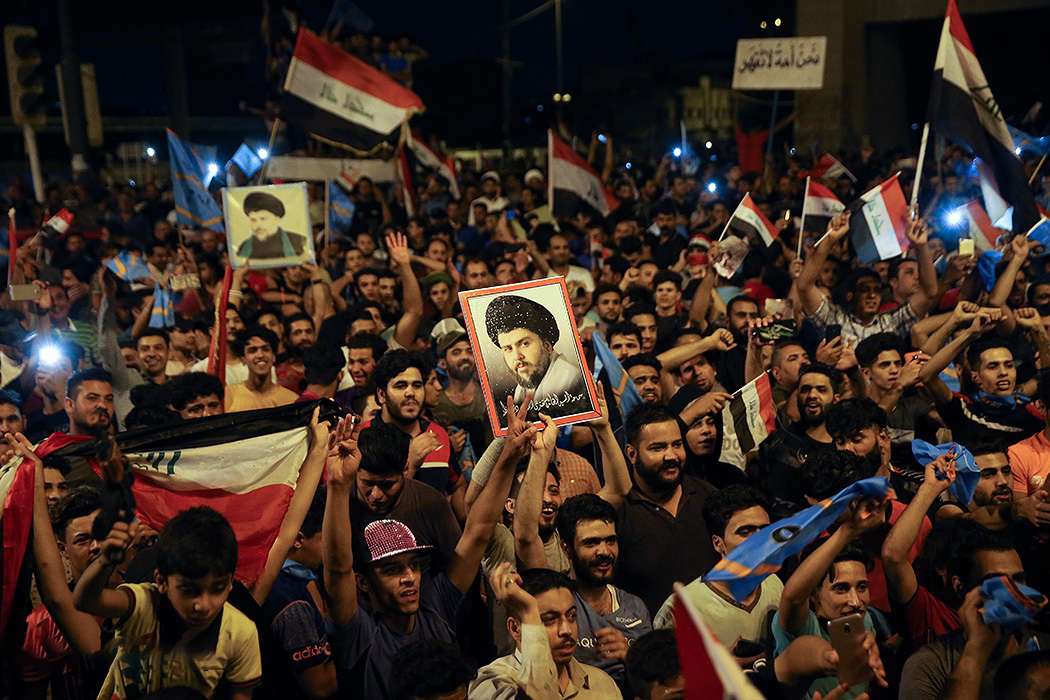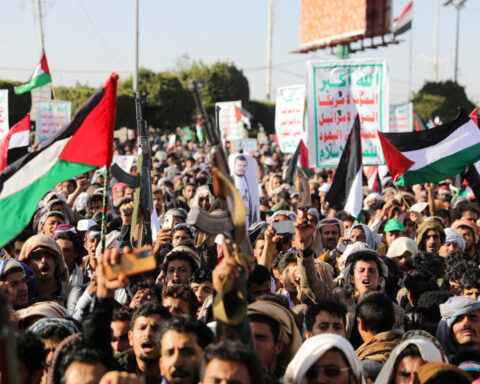BAGHDAD (Parliament Politics Magazine) – In support of powerful Shia leader Muqtada al-Sadr, protesters broke into the Iraqi parliament once more, inflicting at least 125 injuries and worsening the political deadlock.
The protest on Saturday comes after protestors stormed the parliament and forced the suspension of a vote to name a new prime minister.
Thousands of supporters of al-Sadr and his Sadrist Movement stormed into parliament on Saturday after tearing down concrete barriers and entering the Green Zone, which is home to government agencies and diplomatic offices.
Similar protests took place again on Wednesday, but this time, the Ministry of Health reports that at least 125 people—100 citizens and 25 members of the security forces—were injured.
Stones were thrown by Al-Sadr’s supporters and police used stun grenades and tear gas.
“We demand an administration free of corruption… and those are the demands of the people,” Abu Foad, a demonstrator among the masses waving national flags and placards bearing pictures of al-Sadr, told the Reuters news agency.
In a statement, the media office of Prime Minister Mustafa al-Kadhimi urged security personnel to ensure the protection of government facilities.
Mahmoud Abdelwahed of Al Jazeera reported from Baghdad that al-Sadr’s supporters now had complete control of the parliament’s headquarters.
What was different this time was that they didn’t intend to leave until, as they claim, their demands were satisfied, Abdelwahed added.
The pro-Iran Coordination Framework’s choice for prime minister, Mohammed Shia al-Sudani, a former minister and province governor, is opposed by demonstrators.
Al-Sudani’s appointment to the position of prime minister was up for a vote on Saturday, but the meeting was called off following Wednesday’s events.
They felt al-Sudani was just like Nouri al-Maliki, the former PM whom they accuse of corruption, and they did not want the parliament to approve him, Abdelwahed said, adding that a lot of people claimed that during his two tenure as prime minister, he destroyed the nation.
(Protesters) intended to barge into the headquarters of the Supreme Judiciary Council, but at the last minute, one of al-Sadr’s aides told them to back off, keep it quiet, and keep it calm.
It has been incredibly disorganised and chaotic despite all of these appeals from politicians to refrain from violence and keep it peaceful. The situation is still highly serious, Abdelwahed reported.
Political impasse
Al-Sadr’s bloc won the most seats in the parliament after the October elections, but it still fell far short of a majority.
The political deadlock over the formation of a new government has persisted for ten months, the longest stretch since the US invasion of the oil-rich nation in 2003.
The two-thirds majority required to choose a president, a crucial step before choosing a prime minister, was not achieved by quarrelling political groups. Prime Ministers are traditionally chosen from among Iraq’s Shia majority.
Al-Sadr withdrew his group from the parliament and declared he was terminating efforts to form a government after the talks came to a standstill.
Due to Al-Sadr’s withdrawal lost dozens of seats to the Coalition Framework, an Iran-backed alliance of Shia party.
Since then, Al-Sadr has followed through on threats to incite unrest among the populace if parliament approves a government he disapproves of. He claims that the government must be free of foreign influence, including that of Iran and the United States, as well as the corruption that has afflicted Iraq for decades.
Al-Sadr’s supporters yelled at his adversaries who are now attempting to establish a government on Saturday. There were numerous demonstrations in front of the Supreme Court of the nation, which al-Sadr has accused of interfering in order to stop him from forming a cabinet.
A statement issued later on Saturday by the Coalition Framework in response urged Iraqis to protest peacefully in defence of the state, its legitimacy, and its institutions, sparking worries of confrontations.





